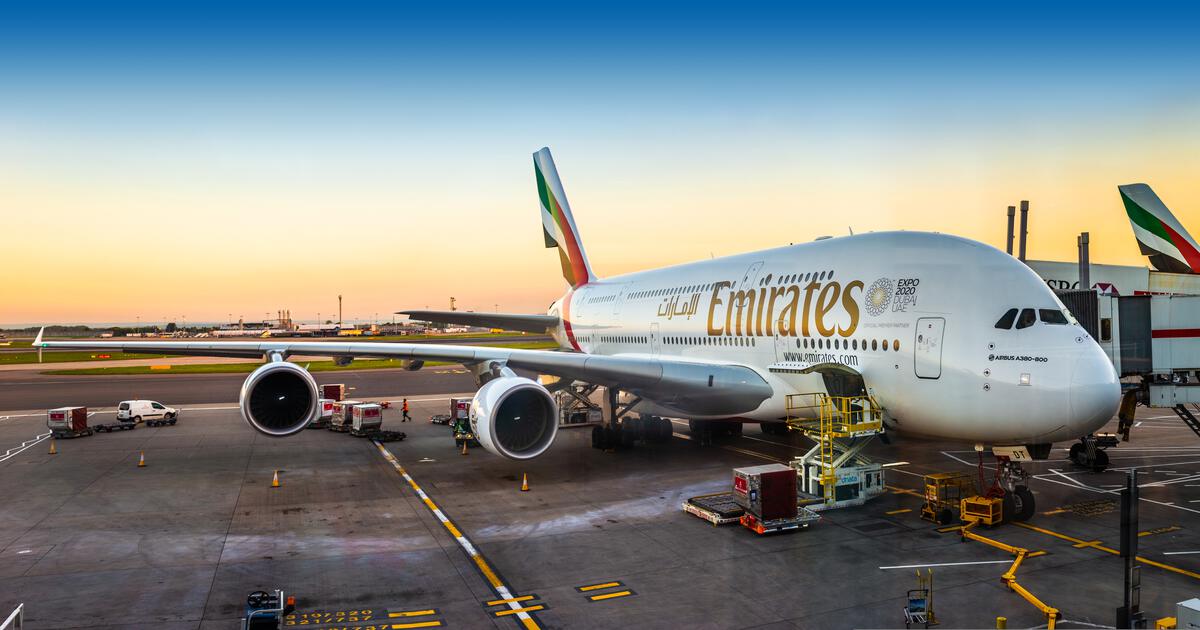
Commercial Aviation, Airport Management
Business Wire | January 25, 2024
Aviation Capital Group LLC (ACG), a premier global full-service aircraft asset manager, announced the delivery of one new Airbus A320neo aircraft on long-term lease to Scandinavian Airlines (“SAS”). Featuring CFM International LEAP-1A engines, this is the ninth of ten aircraft scheduled to deliver to the airline as part of a multiple-aircraft sale-leaseback transaction between ACG and SAS.
ACG specializes in commercial aircraft leasing and aviation finance. In addition to aircraft leasing services, we provide aircraft asset management solutions tailored to meet our customers’ fleet management needs. To learn more about the aircraft leasing and aircraft management services offered by ACG, visit www.aviationcapitalgroup.com.
Forward-Looking Statements
This press release contains forward-looking statements within the meaning of applicable federal securities laws. Any such statements, other than statements of historical fact, are based upon our current expectations and assumptions concerning future events, which are subject to a number of risks and uncertainties that could cause actual results to differ materially from those anticipated. Accordingly, such statements are not guarantees or assurances of any aspect of future performance. Except as required by applicable law, we do not undertake any obligation to, and will not, update any forward-looking statements, whether as a result of new information, future events or otherwise.
Read More

Air Transport, Cargo Management, Airport Management
PR Newswire | February 01, 2024
Delta Cargo is excited to announce the launch of its newest product, DeliverDirect, developed in collaboration with SmartKargo. DeliverDirect is a door-to-door delivery service for the U.S. market, offering a competitive and customizable solution for e-commerce retailers seeking to optimize their direct-to-consumer shipping solutions.
With DeliverDirect, Delta Cargo pioneers an innovative domestic carrier approach, providing swift service with transparent pricing for e-commerce and small parcel delivery.
From initial warehouse pickup to delivery at the end consumer's doorstep, DeliverDirect is a fast, seamless, end-to-end service that upgrades traditional ground or air shipping services utilized by most current e-tailers. Small package shippers will benefit from increased shipping speeds, an uncomplicated pricing structure, proactive alert management, transparent tracking and reporting, and access to Delta's vast domestic network.
"We are thrilled to introduce DeliverDirect, our new offer for the small parcel delivery market," shared Alison Ricker, Managing Director, Delta Cargo Global Sales. "Through our strategic collaboration with SmartKargo, DeliverDirect gives e-tailers an alternative transportation solution that fits their customers' requirements, and we envision that this service will prove to be a fast, reliable and cost-effective solution."
The DeliverDirect offering can be tailored to shippers' needs with a variety of service innovations that empower customers to customize according to their unique preferences. These service innovations include: personalized pick-up times, geo-fenced notifications for consumers, multiple delivery attempts, signature-required deliveries, proof of delivery with photos, and access to advanced reporting features for a complete comprehensive service that aligns seamlessly with a variety of needs.
"E-commerce shippers are looking for simple, faster and more reliable alternatives to deliver their products to consumers. Delta Cargo has a vision for small package delivery that will transform the U.S. market and continue to diversify their already robust offering in the air cargo market. Their innovative approach makes them a fantastic partner for SmartKargo, and we look forward to growing this service together," stated Milind Tavshikar, CEO and Founder of SmartKargo.
Read More

Aerospace, Aviation Technology, Airport Management
PR Newswire | January 27, 2024
Avelo Airlines' first international service takes flight this weekend from Lansing's Capital Region International Airport (LAN) in partnership with Apple Vacations. The partnership's new scheduled public charter service will serve three international destinations from LAN.
Avelo and Apple Vacations offer nonstop flights and vacation packages between LAN and three tropical international destinations: Cancun, Mexico; Montego Bay, Jamaica; and Punta Cana, Dominican Republic beginning tomorrow, Jan. 27 through April 3, 2024. Booking information and specific flight dates and times can be found at AppleVacations.com.
Beginning Jan. 27: Lansing to Cancun International Airport (CUN) – three times weekly on Saturdays, Mondays, and Wednesdays
Beginning Feb. 2: Lansing to Montego Bay's Sangster International Airport (MBJ) – one time weekly on Fridays
Beginning Jan. 28: Lansing to Punta Cana International Airport (PUJ) – two times weekly on Sundays and Thursdays
Avelo Airlines Chairman and CEO Andrew Levy said, "These three tropical destinations Avelo will operate for Apple Vacations from Lansing are the perfect debut of Avelo's international service. We look forward to offering the same reliable and friendly experience to Apple Vacations' Customers that we've been providing Avelo's Capital Region Customers since we took flight at LAN 15 months ago. Apple Vacations' selection of Avelo to operate their flights to these three popular destinations is a testament to positive reputation we've built in Michigan and across the country."
Additionally, Avelo offers twice-weekly scheduled service between LAN and Orlando International Airport (MCO). Avelo is the only airline offering nonstop service between LAN and MCO. Nonstop service to Orlando can be booked at AveloAir.com.
Since Avelo began service at LAN on October 26, 2022, the airline has flown over 30,000 Customers on nearly 300 flights. Avelo also leads LAN in reliability with a 100% completion factor, meaning there have been no Avelo cancellations at LAN since the airline inaugurated served there 15 months ago.
Capital Region Airport Authority President and CEO Nicole Noll-Williams said, "We are thrilled that Apple Vacations is back at LAN for our 2024 international season. And we couldn't be more excited that Apple selected Avelo Airlines to operate these flights with their exceptional track record for reliable and friendly service. These nonstop flights to Mexico, the Dominican Republic, and Jamaica for 2024 are another reminder that LAN is a gateway to popular vacation destinations around the world – and it's not too late to book your trip!"
America's Most Convenient Airline
Avelo was founded to Inspire Travel by saving its Customers time and money. Since taking flight on April 28, 2021, Avelo has flown 4.2 million Customers on over 30,000 flights. Today, Avelo serves 43 destinations in 23 states and Puerto Rico.
Along the way, Avelo has unlocked a new era of convenience, choice and competition by flying unserved routes to primarily underserved communities across the country. Every Avelo flight is nonstop, and at least one airport on every Avelo flight is a small, easy to use airport – making every Avelo journey easier and more enjoyable.
Avelo is distinguished by its reliability. In 2023, Avelo achieved the lowest flight cancellation rate and the second-best on-time performance in the U.S. airline industry.
Avelo Customers can always change or cancel their itineraries with no extra fees. Additionally, families can travel with ease knowing every child 13 and under will always be automatically seated with an accompanying adult at no additional cost.
Additionally, Avelo offers advanced seat assignments for sale. One third of its seats are extra leg room seats, ranging from 32 inches to more than 36 inches, offering a more comfortable experience for Customers who value more space. In addition to advance seat assignments, Avelo offers several unbundled travel-enhancing options that give Customers the flexibility to pay only for what they value, including priority boarding, checked bags, carry-on overhead bags, and bringing a pet in the cabin.
Read More